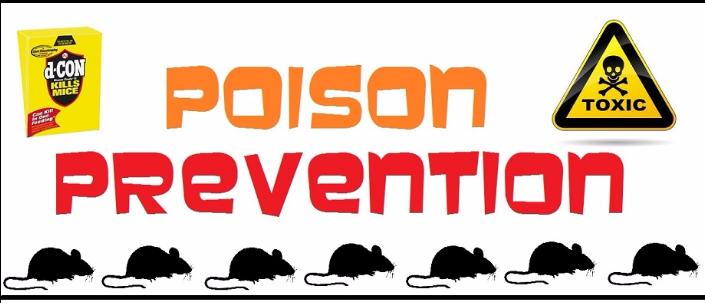
Greetings, everyone! Dr. Martini here. March is poison prevention month so I wanted to share with you this scary story of a family and their close call with rat poison. You may not to have these types of products in your house, but unfortunately, you can’t prevent your neighbors!
E.B., a 1 year old female lab, was taken by her pet sitter to the Animal Emergency Center for coughing up blood. The pet sitter was not aware of anything she may have gotten into, but she does have free access to pasture land between neighbor’s houses. On exam she was lethargic and her lung sounds were abnormal. Lab work showed that it was taking much longer than normal for her blood to clot and x-rays of her chest showed her lungs had fluid in them (most likely blood). The presumptive diagnosis was a blood clotting issue, most likely caused by unknown ingestion of rat poison.
Rat poison is commonly found as pellets such as d-CON. The problem is that the company must make the poison tasty to attract the mouths of rats but, therefore unintentionally dogs and cats too! There are two main types of rat poisons. Types containing anti-coagulants such as Warfarin have been the most common. Warfarin decreases the body’s ability to form blood clots by blocking the formation of vitamin K. The newer generation products contain bromethalin which works by causing nerve cells in the brain to swell leading to paralysis and death.
E.B. was given a blood plasma transfusion to replace her clotting factors as well as oral Vitamin K to help her blood to clot. Her clotting times did not improve however and she continued to lose blood. A second plasma transfusion was needed after which her blood clotting times finally normalized
The next morning she was transferred to SWVH for day time care. On exam she was remarkably stable given what she had gone through the night before. She had a persistent cough but her clotting times remained normal and she did not lose any more blood. A close call but happy ending for the sweet girl, however unfortunately, her house mate began to show odd symptoms now too, a total of 12 hours later. Though the owner did not see any visible blood like with E.B, Gio was acting very tired and breathing with increased effort.
On exam Gio was lethargic and her gums were pale. Her heart rate was elevated and she was breathing hard and fast. Her lung sounds were also abnormal like E.B's. Bloodwork showed severe anemia (low red blood cell count) and prolonged blood clotting times. X-rays of her chest showed a large amount of fluid (also suspected blood) between her lungs and her chest wall. It was presumed that Gio had also ingested the same anti-coagulant rodenticide that had made E.B. sick.
Gio was immediately treated with oral vitamin K and given a plasma transfusion. Gio was prepped for transfer to the Animal Emergency Center for overnight care where her red blood cell count continued to decrease and it became harder for her to breathe. She was losing too much blood around her chest cavity that her lungs would not expand with air. A blood transfusion was performed to replace some of the blood lost and also provide those effectual clotting factors.
Given the gravity of Gio’s situation, the decision was made to perform a thoracentesis – a procedure where a needle is inserted into the chest and fluid is drawn off. Approximately 340mls (almost 3/4 of a cup) of blood was drained and her breathing improved. By the next day her clotting times returned to normal but her respiratory rate and effort increased again. Another 300ml of blood was drained from her chest. Finally, her breathing returned to normal for good and she was sent home to recuperate.
After extensive investigation, E.B and Gio’s owners discovered that one of their neighbors had put rat poison along the fence between their properties. The neighbors were not aware that the poison that had since blown into E.B and Gio’s yard and could harm dogs.
Both E.B. and Gio had to take Vitamin K pills for one month to treat the poison that remains in their system. One month later at their recheck, both dogs were happy and healthy with normal blood clotting times and were able to stop the medication and return to their normal routine at home.
Luckily E.B. and Gio’s story had a happy ending. With toxins, prevention is the key! To refresh your knowledge about other toxins that can harm your pet, please click the link below:
ASPCA Pet Insurance: 101 Things You Didn't Know Could Harm Your Pet
Christina Martini, DVM
*Story used with permission by E.B and Gio’s owners*
